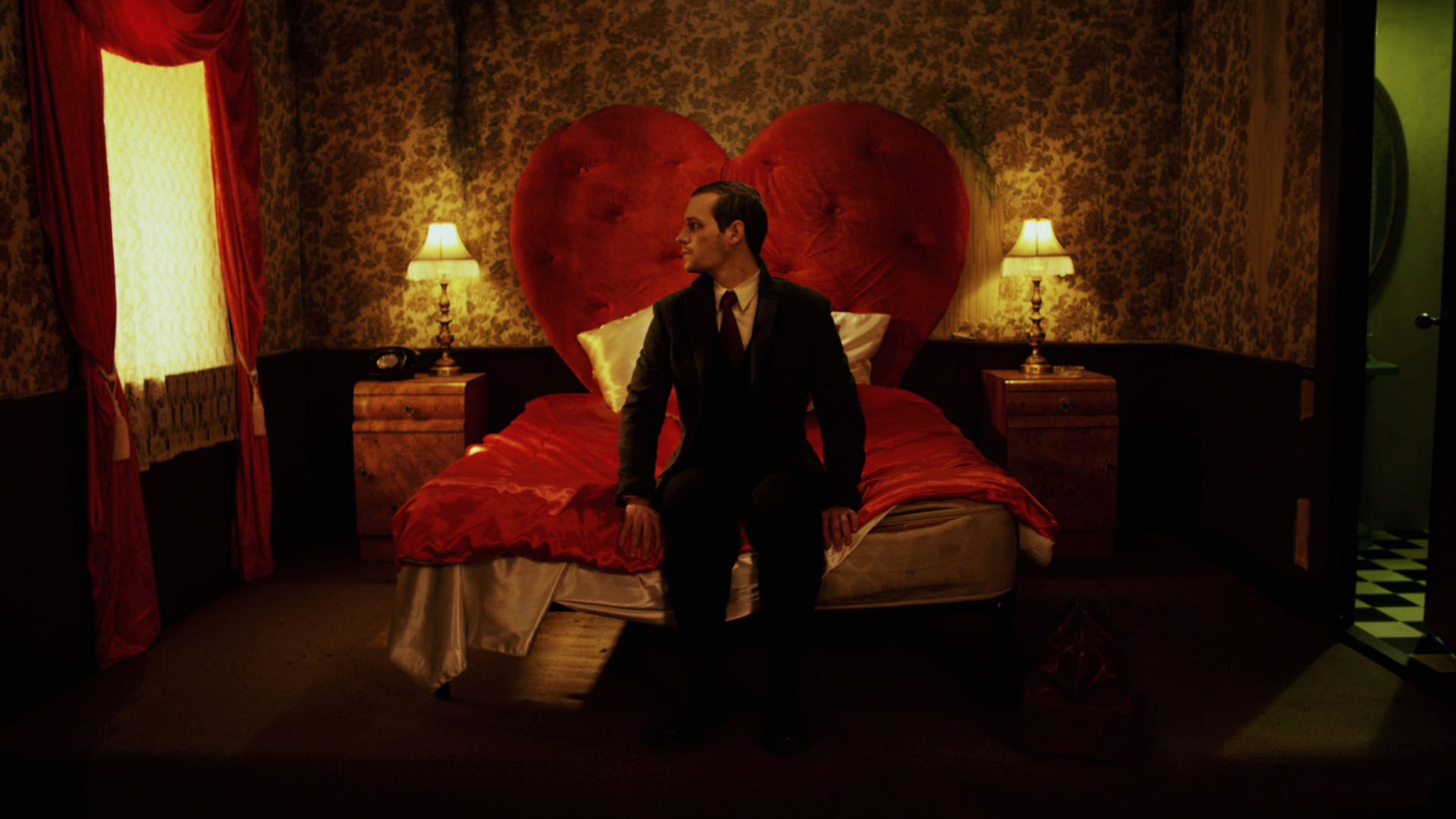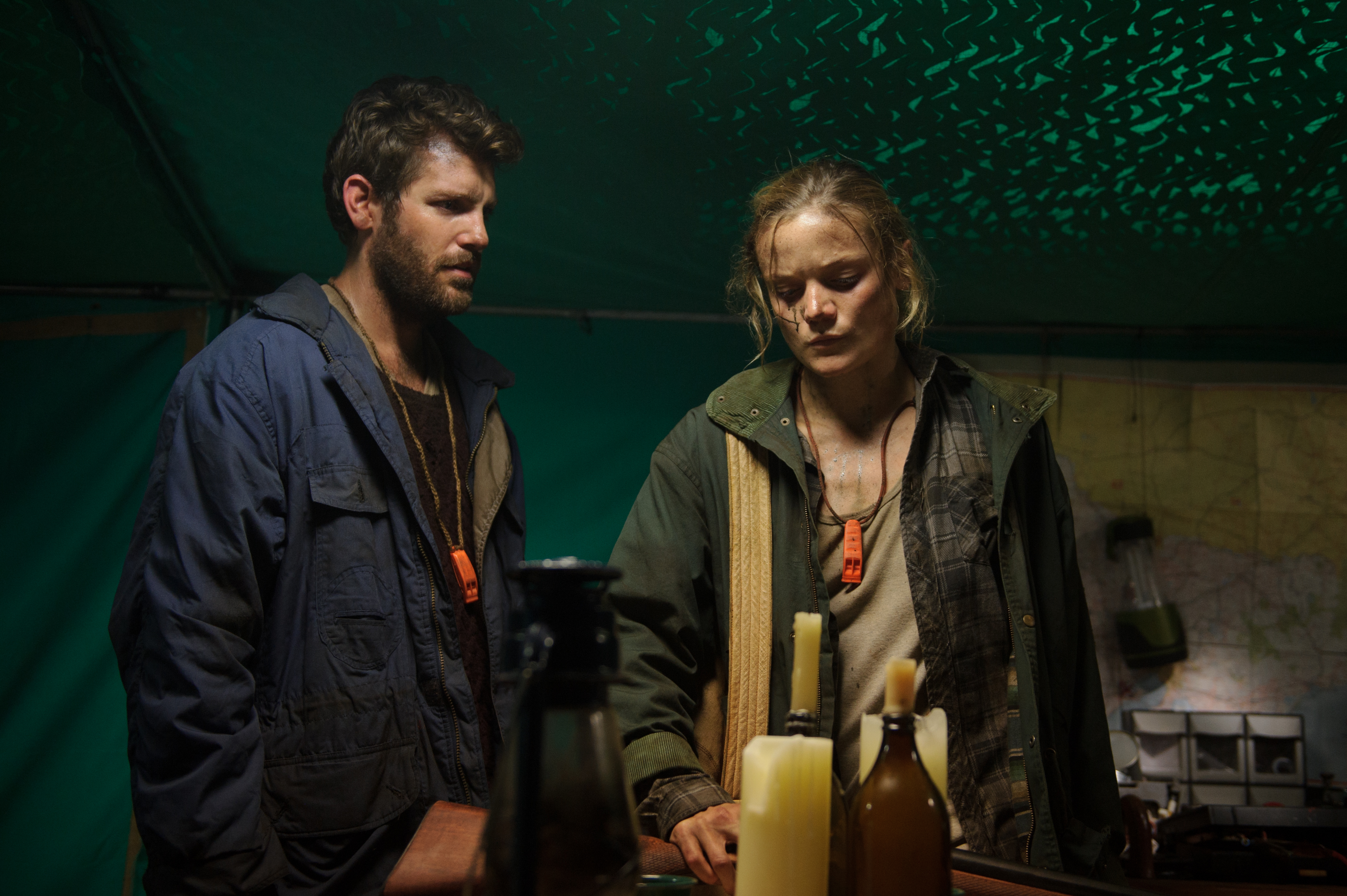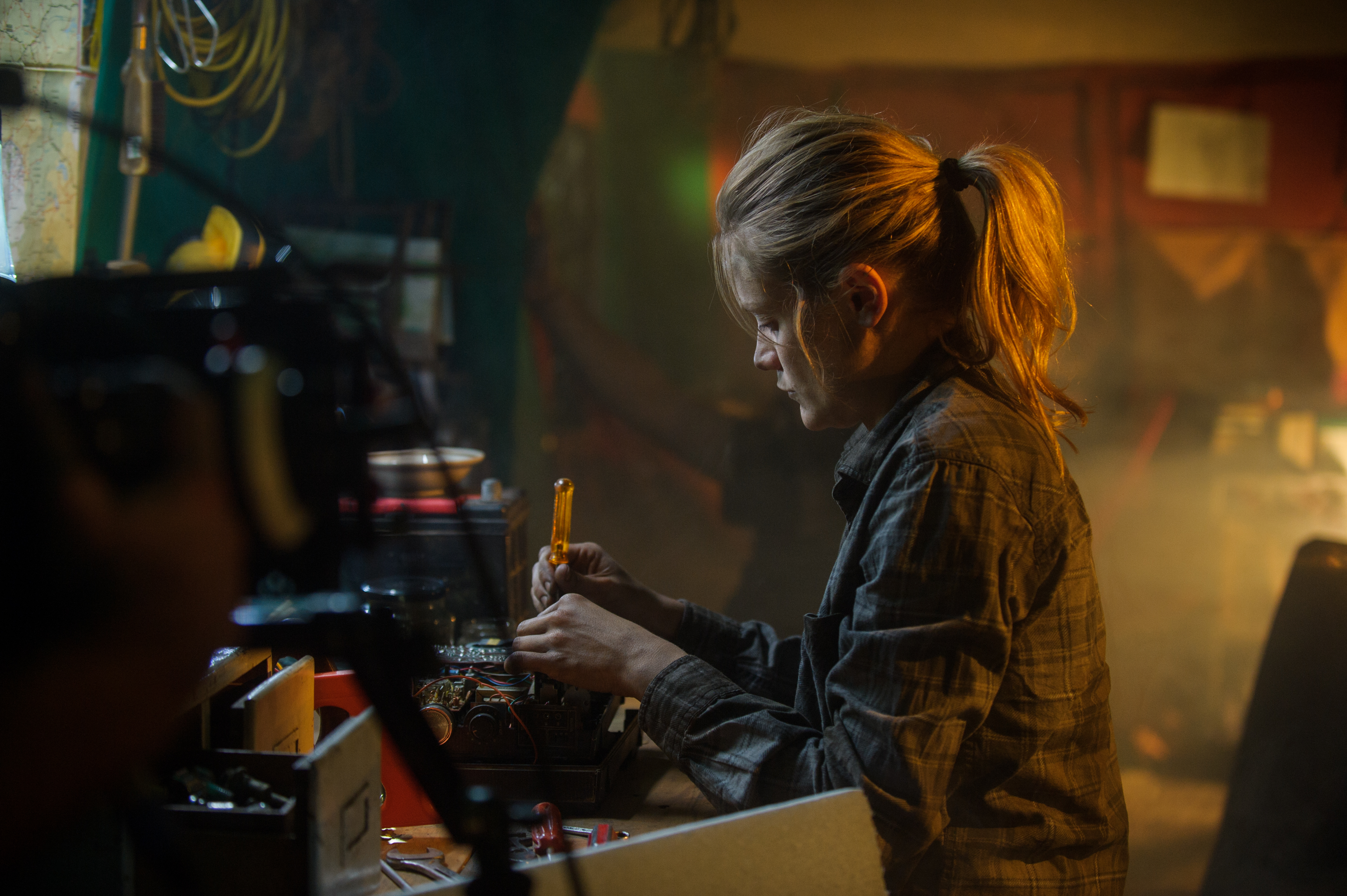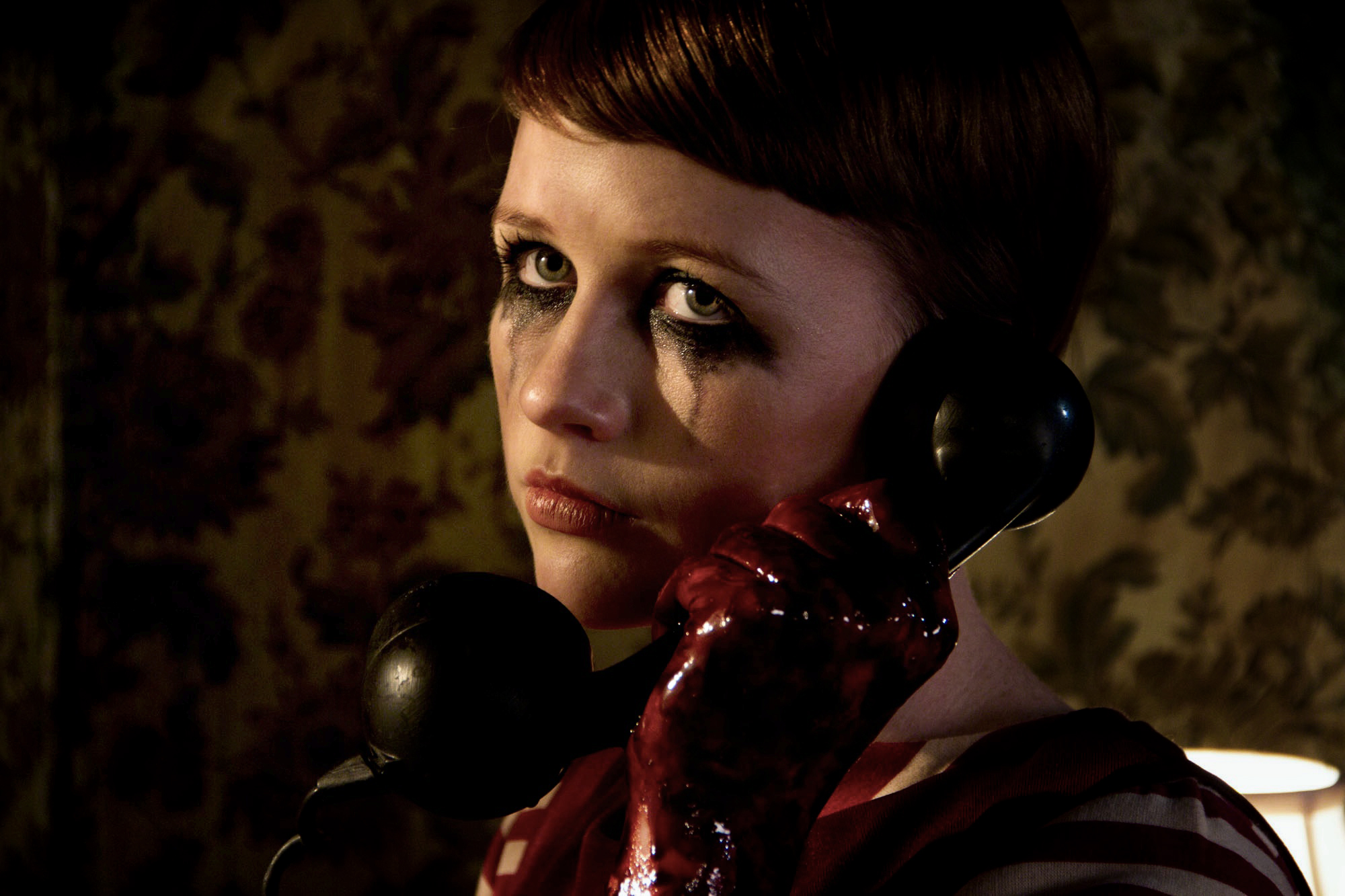Local talent.
Jordan Prosser has been on our radar for a while now. If there is an independent filmmaker in Melbourne manipulating genre better than he is then we’re yet to come across them. Jordan’s short film, Hungry Man, recently took out the Most Exciting Talent Award for its production design at the ReelGood Film Festival 2016 and was one of the most talked about films of the whole event. We also got to check out his latest flick, Tanglewood, which is currently running the film festival circuit. This guy is one to watch. We were lucky enough to get to chat to Jordan about his films, his experiences as an independent filmmaker and his love of film.
What first got you interested in filmmaking?
I really wanted to be a superhero, or maybe a cop, when I was in kindergarten. I just remember thinking it would be really cool to stop bank robberies, to save the day. But then I got a bit older and realised what I actually wanted was to pretend to do that, so I decided to be an actor. But then I got bit older again and realised that I didn’t want to just be in stories, I wanted to be telling those stories. It’s funny now thinking back to the days when I (and I reckon a lot of people) just had no clue at all how movies got made. I think it’s only really since the advent of DVDs and their director’s commentaries and behind-the-scenes featurettes that the general public has a solid grasp on what goes in to making a movie. Before that it felt like your person on the street might not have really known what a director actually did. Or what the difference was between a director and a producer and a cinematographer. You’d say, ‘I want to be a director,’ and they’d say, ‘oh, like a cameraman?’ But now everyone’s on to it. Everyone gets how it works. I think my aha moment was watching Paul Thomas Anderson’s Magnolia when I was 11 years old. By that age, sure, I knew that movies were made by people – but there was something so palpable in how that movie was told, it just leapt out at me. I was like – woah. Someone has decided absolutely everything about what I am seeing. There are no coincidences or happy accidents here. This is all by design. It was the final piece of the puzzle. I didn’t want to be in stories, or to simply tell them – it would be about telling them in a very certain way.
When did you decide to pursue a career in the industry?
That’s a funny question, because at first I don’t think you realise that it is an industry, per se. And then you go see Titanic and someone tells you it cost 200 million dollars to make. Two hundred million dollars. Sooner or later it dawns on you that what you want to do with your life is hideously expensive. That your ideas, no matter how magical or unique, will always have a price tag attached. That’s a shitty thing to realise, and it can really put you off. In my weaker moments, that’s when I say, fuck it: I’ll write novels instead. It’s free, and you can do it on your own, anywhere, any time. But then you come around, and you accept that it’s an industry, sure, it’s a machine – and like any machine, the more you know about how the machine works the better you can make it work for you. So I decided to go to film school. I know a tertiary education is hardly what makes a good filmmaker – but there were facts to be found out, and there was knowledge to be had that I knew I could get there. So I moved to Melbourne to go to film school at the VCA.
What are some of your main influences, both in style and content?
I’m a sucker for genre movies. Just in recent years I think I’ve really cemented that as my schtick, sort of. But it’s funny, because the last two short films I’ve made could be broadly described as “horror” – but I fucking hate horror movies. I reckon maybe The Thing was the last good true horror movie, and they have all sucked to varying degrees ever since. But that’s because they stopped being horror movies. Horror movies used to be about psychology, and they used to have something to say. They were about horror as an emotion and a mindset, not merely spectacle and endurance. I learned a little while ago that that old-school style of horror filmmaking is now referred to as “elevated” horror, which is so sad and pretentious it makes my toes curl, but nevertheless: according to my producer, if I’m ever trapped in a burning building with a Weinstein, apparently I should describe what I do as “elevated genre” – that is, something which fulfils the genre quota of thrills and spills but also has a heart and something of a head on its shoulders. So the stories I love, the filmmakers I love, do that. They walk the line between realism and all-out fantasy. People like David Cronenberg. David Lynch. Stanley Kubrick. Jean-Pierre Juenet. Martin McDonagh, Jeff Nichols. David Fincher. Luc Besson. Rian Johnson. Jeremy Saulnier. Sally Potter. Ben Wheatley. Guillermo del Toro. Jane Campion. Jean-Luc Godard. Wes Anderson. PTA. All those people make films which are so goddamn good to look at, so much goddamn fun to watch, but can still make you cry, or think, or feel something you haven’t felt in a certain way before. For me it’s about filmmakers and storytellers who understand that humans don’t like being told things, or shown things, the way traditional realism and naturalism dictate, and that good storytelling can be a spoonful of sugar to help the medicine go down.

What element of filmmaking do you enjoy the most?
I assume this is a trick question, because making films is utterly terrible and will no doubt be the death of me. The word “enjoy” implies a sort of zip-a-dee-doo-dah contentment, which is not the feeling you get from filmmaking. There’s not much to enjoy, but there are things to love – love being a feeling that affects you very strongly be it good or bad, passionate or punishing. So some of the things I love about filmmaking… well, the moment when you have an idea so wonderful that you wish the film already existed so you could go watch it yourself. And you’ll go through a whole day just exploring the possibilities of that world in your head, and go to bed not remembering a single thing you actually did that day because you’ve been exploring that idea for hours and hours and hours. You’re already making it. I also love the people you get to make things with. Last year I made a short film called Tanglewood, which I wrote with the intention of being a two-day shoot with a couple of mates in the country for a few hundred dollars. Just to stretch the directing muscles, y’know, stay sharp. But then I get all these goddamn awesome people on board, and they just want it to be better. They want it to be as good as it can be, and suddenly I’m the one trying to hold it back! But I relented. And then it became a 15-day shoot with a studio build and a week on location with 30 cast and crew, and it took us a year to finish it. But how much better is that film than the shitty one I initially wanted to make? Infinitely. So I love those people dearly. Oh, and I love it when it’s done. I love sitting down to watch a finished thing, because it instantly strips away whatever hardship and heartache there was involved in the making. Some people say they can never watch or enjoy their own films, but I’m the opposite. If I’ve done it right, I’ll sit down and watch it and just have the best fucking time.
What are some of the bigger hurdles you’ve had to face in filmmaking, either on a particular film or in a broader sense?
I’ll get the obvious one out of the way first, and that’s money. Titanic cost 200 million dollars to make (in 1997), so if Screen Australia spent every single cent of their annual operational budget it would still take them two and a half years to finance that one movie (without adjusting for inflation). The industry is bleak. It’s so very, very bleak. But you have to push that negativity to the side, because you can’t sit down to write the first page of your first draft and go, ugh, this’ll never get made. Because then, of course it won’t.
The hurdle I’ve always faced on a more granular scale is wanting to keep people happy. I remember during the shoot of my 3rd-year VCA film, I decided to lose a shot at the end of a day because we were running 20 minutes over. And it completely fucked me in the edit. The whole film suffered because we didn’t have that shot. But I had the happiest crew you could imagine. I took such good care of them. By contrast, I worked on a few of my classmate’s sets, and while they weren’t tyrants by any means, the comfort of the people working for them was not their number one priority. The film was their priority. They would skimp on the catering to bolster the art department budget. They’d go two, three, four hours into overtime. And the thing I learned was: people forget a hard shoot, but they remember a good film forever. Which is sort of… dangerous knowledge, in a way. Is that a license to treat everyone on set like shit? Absolutely not. But there are times when maybe you have to choose what it is you’re willing to compromise – your likability, or your film.
Here’s one more hurdle for you – politics. It took me a very long time, quite some years into my adult life, before I was able to really look outside my sphere of experience (as an educated, white, Western male) and form the beginnings of a social conscience. To understand the vast, ingrained problems there are in terms of opportunity and representation in cinema, both on- and off-camera. I’m still learning and feeling my way around these things, as I know a lot of people are. I guess I find these issues particularly pertinent because I want to be a genre filmmaker, and as much as I adore it, genre storytelling has a lot to answer for in terms of glorified violence, sexual violence, gender stereotypes, racial stereotypes… the list goes on. Genre can be so powerful because it plays off cultural short hand, but sometimes that also means shortcuts, cliches, laziness. That means genre movies today often have the same outmoded gender politics that they did 70 or 80 years ago. That means you still have sexual violence being used as a one-size-fits-all character motivator for female protagonists. It’s like that loveable but bigoted uncle you just don’t know how to talk to at Christmas. It can all seem a bit daunting at first, but I think I’m starting to realise… maybe it’s not all that hard to make things better? Maybe you just need to be not lazy? Like, why does your character have to be this age, this gender, this ethnicity, this whatever? Why do these certain things have to happen to them? If the answer basically boils down to tradition, then that’s not good enough. There’s newer, better ways. I also think that if you really, really love movies then you have to want everyone to love them as much as you do. When I said before that I grew up wanting to be a superhero, then an actor, then a director – those were easy things for me to wish, because I’d seen a million people just like me do it in movies and TV. Imagine if you’d never seen anyone like you do anything awesome in a movie! Fuck! I mean, I can’t really imagine it, because I’m a white dude, and most movies ever have been made by people like me for people like me. But even just trying to imagine it breaks my fucking heart. Like, imagine you’ve never had that moment in a movie where someone does something so beautiful, or profound, or so fucking cool, or just so cinematic, and you get that rush because it’s speaking directly to you. Imagine if movies just didn’t speak to you. That’s fucking unconscionable to me. So, I dunno. Now I’m rambling. Anyway. Right now I’m writing a Goldrush-era vampire western about a young Chinese girl and an old British woman who team up with a gang of Indigenous bushrangers to defeat an insane Irish priest, because why the fuck not.

What do you think makes a great film?
Maybe this sounds a bit vague, but I think what makes a film great is when it’s true to itself. My favourite reviewer of all time was and is the late, great Roger Ebert. He was a beautiful writer, a great thinker, and what I loved about the way he discussed films was that he always judged them on their own merit. He didn’t have some lofty fondness for highbrow, arthouse movies, or some soft spot for a particular genre. He judged every film equally based on what it set out to achieve, and I think that’s the way films should be judged. If a six-hour Albanian war epic was just as good as the latest action franchise flick or a raunchy American frat comedy, they would all get full marks. I think a great film knows what it wants to be and sticks to it. It’s not trying to pander to the masses, or impress a select few; it’s just trying to be the best version of itself.
Do you think success in short film translates to success in feature filmmaking?
Yes and no. Short films are no doubt a vital training ground for feature filmmaking – so many of the basic principles are identical. I know when we finished making Tanglewood my producer and I were both like… I reckon we could do that exact thing we just did, but for four weeks instead of two, and we would have a feature film. But does it translate to success in terms of exposure and opportunity? I don’t think it does. Short films are commercially useless. I think if you want to be making feature films it takes a lot more wheeling and dealing than simply having a few good short films under your belt. But, if the wheeling and dealing pays off and the time to make a feature comes, I imagine you’d be using a lot of the skills you learned making shorts, and you’d be thankful for those occasions, even if at the time they felt like a half-measure.
Do you engage in social media as part of the filmmaking process? Do you think social media platforms are becoming a bigger part of filmmaking?
Uuunnnnghhhhhh yes I do but only because I feel like if I don’t I’m going to get left behind. I don’t have the focus or the willingness or the savvy to be a full-time promoter of my own work, but I do accept it as a necessary evil. Right before we started Tanglewood, myself, my producer and a core group of our creative team started a not-for-profit filmmaking organisation called Chaos & Friends, which could serve as the umbrella production company for that show and whatever we made next. One advantage to that was we were able to start a Chaos & Friends Facebook page, and now everything we make under that banner can be promoted through that page. You get probably half-a-dozen invitations to “Like” people’s short films every week, and then you do, and you’ll get two or three updates about festivals they’re screening at over the next year, and then the page goes dark. At least hopefully by operating under C&F we can keep a group of followers in the one place and have some sort of continuity. But seriously, coming up with hashtags for my film projects makes me want to put a bullet in my head. I think social media platforms are pivotal for promoting projects that have an inherently online nature – web series, for example. But short films? Short films you spend two whole years trying to keep them off the internet just so you can play at festivals.
 What’s on the horizon?
What’s on the horizon?
We’re waiting to hear back from a handful of great festivals to see if Tanglewood’s been accepted – and there’s dozens more we want to apply for over the next year. I would really love to be able to travel a bit with the film, and do some of the aforementioned wheeling and dealing I’ve never really had the chance to do outside of Australia. The last time I had a film screening in some festivals, I was totally dismayed with how I fared in the “networking” stakes – you’d want to talk about the film you just made, and all the other person wanted to know was what you were making next. And I had nothing. I was like, I just spent a year making this movie, can’t we talk about that? But they wanted scripts and treatments and ideas for the next thing, and I was humiliated by my own unpreparedness time and time again. So this time I won’t make that mistake. I wrote two feature scripts at the end of last year, I’m halfway through another two at the moment, and will have another two finished by the end of the year. I’m spending the rest of this year writing, so that when someone asks that dreaded question – what are you doing next – I’ll have a well-stocked arsenal of pitches and first drafts I can inundate them with.
Do you have any advice for anyone who wants a career in filmmaking?
I always feel strange getting asked that question, because I’m still so far from where I want to be, so far from what I want to be doing, that I’m not sure it’s my place to dispense advice. But, the one thing I can say for certain is that it’s a war of attrition. As far as I can tell, it all comes down to simply not giving up. I read an interview with the screenwriter Steve Zaillian one time, who had this advice for aspiring screenwriters: he said every year X number of people want to write movies. And of that number, X number of people take a screenwriting course, or seek some sort of education. And then of that number, X number of people actually start writing a screenplay. And then of that number, X number of people actually finish the first draft, and then X number of people write a second draft, and then X number of people show it someone, and then X number of people write another script – and at every stage, X is becoming a smaller and smaller and smaller number. If you actually just do what it is you say want to do – instead of just dreaming about it or talking about it – every day that you continue to do it puts you ahead, and increases your odds. Plus the longer you do it, the better you get. It may all be as woefully difficult and foolishly simple as that. You just keep going for as long as you humanly, possibly can, and then you keep going some more. And I don’t mean this in a framed-motivational-poster, inspirational-online-quote kind of way – I mean it in the very practical sense of: when you finish one thing, start on the next thing. Don’t stop doing things.
For more Featured Filmmakers, click here. If you’re digging ReelGood, sign up to our mailing list for exclusive content, early reviews and chances to win big!
